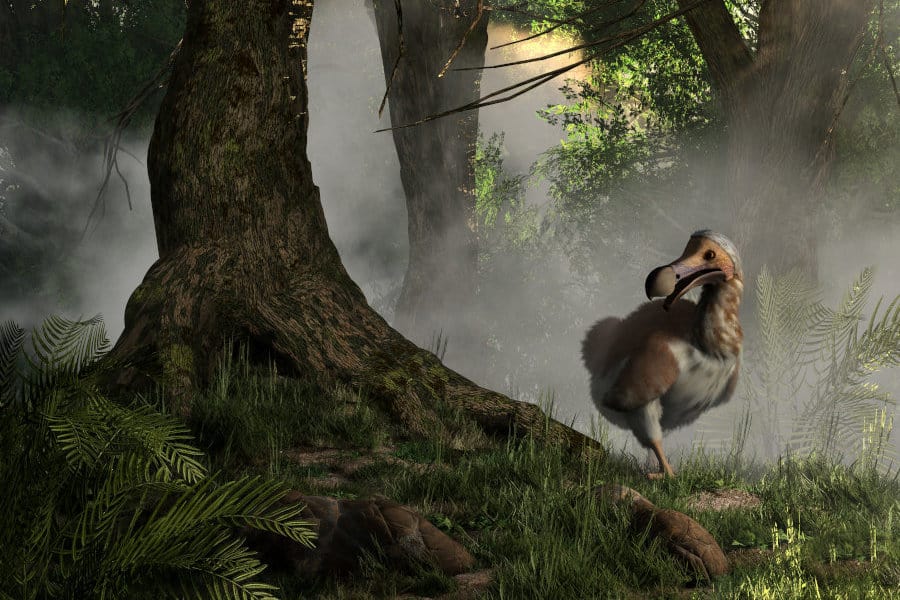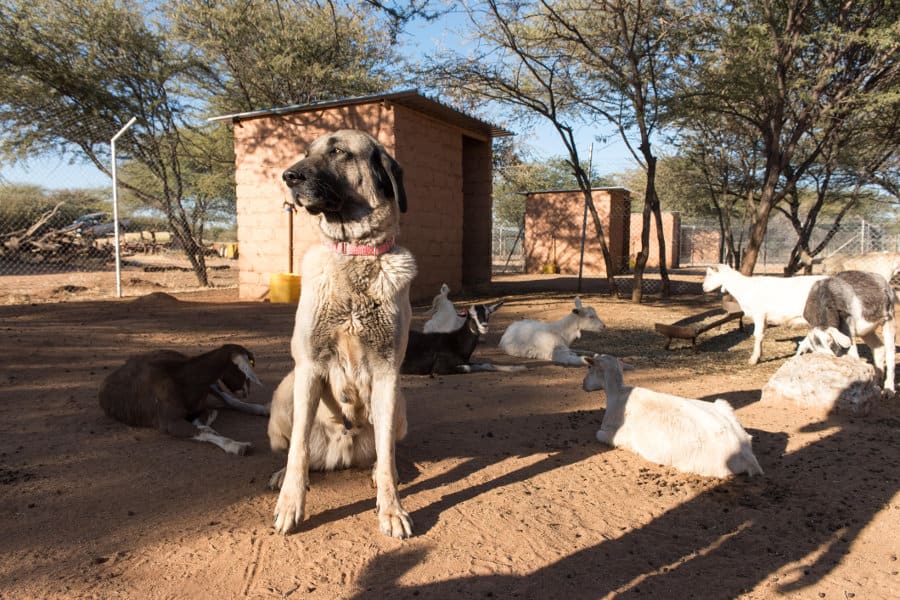
In today’s interview it’s a real pleasure to introduce you to Raphaelle Gasse, Marketing Manager at Tribal Textiles. Muli bwanji Raphaelle, thanks for your time! 🙂
In a few words please introduce yourself, and tell us how Tribal Textiles was born? I believe the business took root over 20 years ago, when Gillie Lightfoot started to experiment with textiles as a « hobby »…
Muli bwanje Michael! Zikomo kwambiri for this interview. My name is Raphaelle and I am responsible for Marketing and Sales at Tribal Textiles.
Below Gillie describes how it all began:
“The textiles started from simple beginnings, under the big Acacia trees in a small safari camp on the banks of the Luangwa River. We set up some makeshift tables on logs, working out the technique took time and patience, and with limited resources, no electricity or running water, Tribal slowly emerged under the limitations that are now its trademark. Inspiration for design came from the environment and the wildlife on the doorstep of this remote little industry. Tribal grew slowly with the support of local Safari operators and tourism, orders were made on the radio; in those days no phones or emails let alone Internet were available.”
How many artisans do you work with? Please also describe the profile of the artisans you employ (gender, location, how you select them or other).

Tribal Textiles has grown from a small group of local artists to a thriving international business employing over 100 people.
Our artisans are local villagers. They usually have small plots of land that they are farming during the rainy season, when our workshop is closed. Men and women are equally represented. Most of them have been with us for years and our turnover is very low.
We first train them, and according to their skills, they either join the sewing department, starching department or painting / colour mixing department. Our head of production is local and has been with our founder Gillie Lightfoot since the very beginning.
All our employees are skilled artisans: their work (especially starching and painting) requires a serious amount of training and practice.
At Tribal Textiles, you « produce unique hand-painted textiles in the heart of the African bush. » Where are you based exactly, and what’s the range of products you develop?

We are based in Zambia, next door to the renowned South Luangwa National Park. It is a very rural area with amazing wildlife and we are living in the heart of the African Bush.
We make a range of beautiful fabrics and home-furnishing products, from bed linen (cushions, throws, bedcovers…) to table linen (placemats, table runners, napkins) as well as wall-hangings, accessories (bags…) and kids products, all made of 100% cotton fabric.
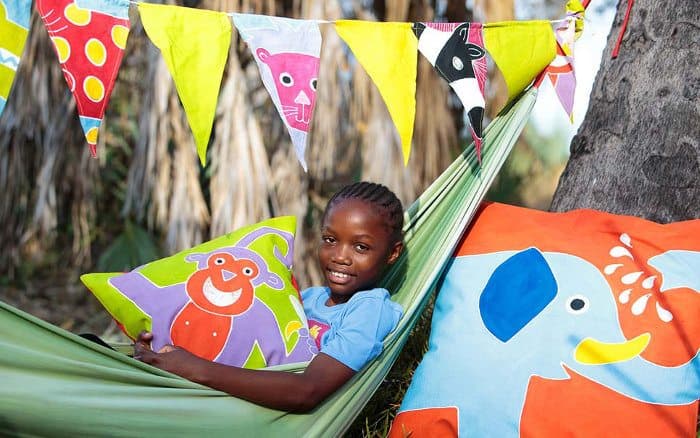
Take us on a « virtual tour » around your facilities. I’m sure a lot of our readers (including me) would love to learn about your production process. Is it possible to visit your facilities to learn how you operate?
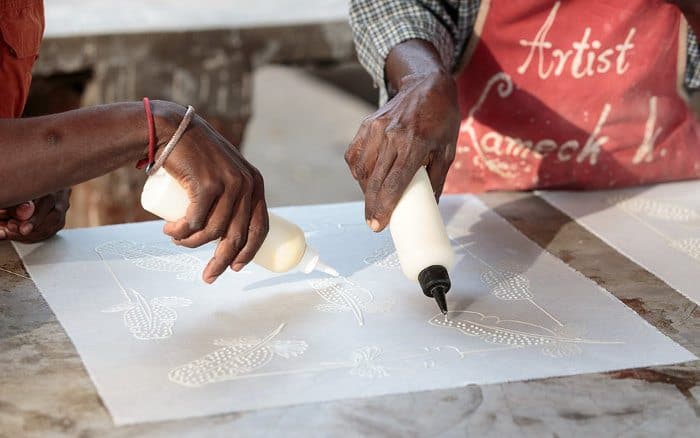
Our technique is close to batik, except that it is not involving wax and dyeing but starching (with a mix of flour and water) and painting on top. It is a relatively simple starch-resist method derived from Mali mud cloth.
It begins with the cutting, sewing & fraying of 100% cotton fabric. Individual designs are drawn onto the cotton with a starch solution made by mixing flour and water. The starched pieces are then dried in the African sun before being hand-painted by local Zambian men and women.
The paints are mixed by hand using primary pigments and a base emulsion: colours are matched by eye to swatches created by Gillie in different colourway combinations. After painting, the pieces are baked which makes the dye colour fast and fully washable.
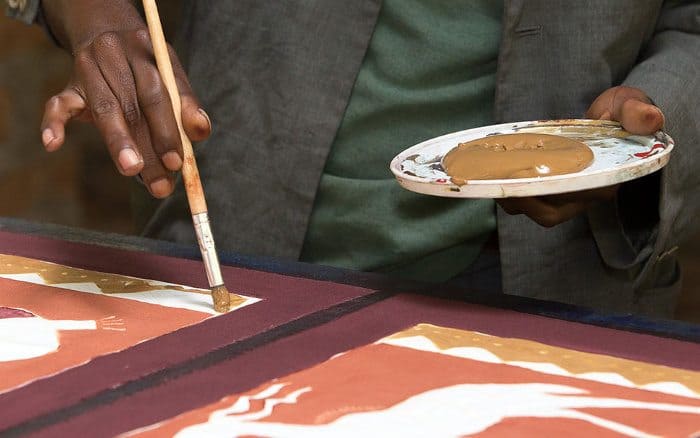
Following cooking, each piece is washed and the softened starch design is carefully scraped off to reveal the finished product. The pieces are then hung up to dry in the sunshine before being sewn up into finished items and packed away for export or transferred to Tribal’s own shop.
We have a lovely and lively workshop open to every visitor, which bursts with the sound of radio and laughter throughout the day. It is separated in different areas and our shop is right next door.
We pride ourselves on the quality of our textiles; made from 100% cotton they can be washed in a washing machine and are functional and durable. We are committed to sourcing all of our raw materials ethically from within Africa.
A business without people is like a ship without a rudder. One of your core values is to have a positive impact on local communities and the artists you work with. Tell us some more about your staff, and how the company contributes to job creation in the Mfuwe area?

We are one of the largest employers in our area, where jobs are seriously lacking (unemployment rate in Zambia is over 80% and most people survive on subsistence farming).
Our objectives are simple: to create unforgettable and exquisite textiles whilst working in harmony with nature and benefitting the local community.
We are passionate about innovative design. We look to reflect the natural environment as well as the character and traditions of the local African people whilst creating designs that are beautiful and contemporary.
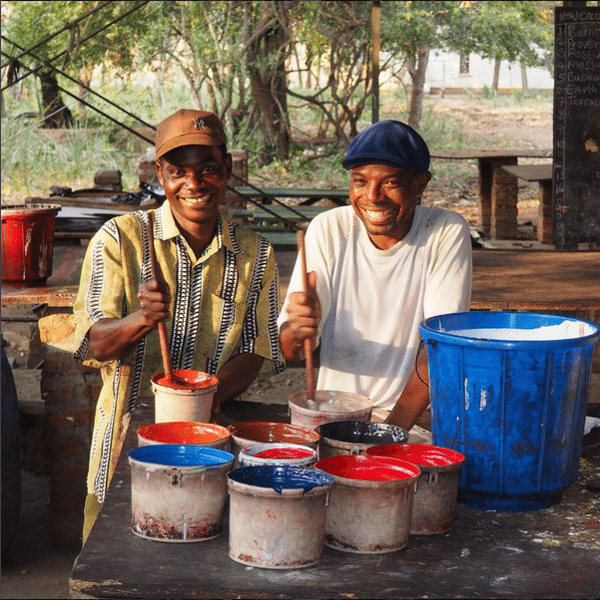
We are committed to providing sustainable employment, training and a happy working environment for all our workers.
We are also involved in the sponsorship and running of our local community school Malimba, and we support a number of other community initiatives, details of which can be found on our website.
If you had to explain Tribal Textiles in numbers, which ones would you choose?
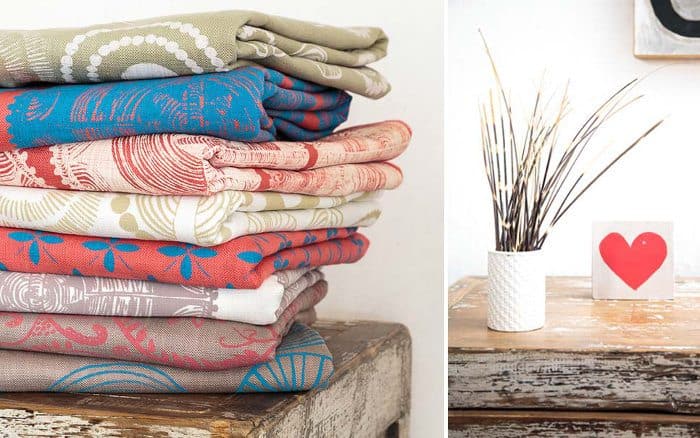
Hundreds of employees, thousands of litres of paint used on a monthly basis, and tens of thousands of metres of fabric!
I’ve heard some « AMAIZING » things about your bags and the Malimba Community School project. Can you expand on this please? These are wonderful initiatives that need to be shared.
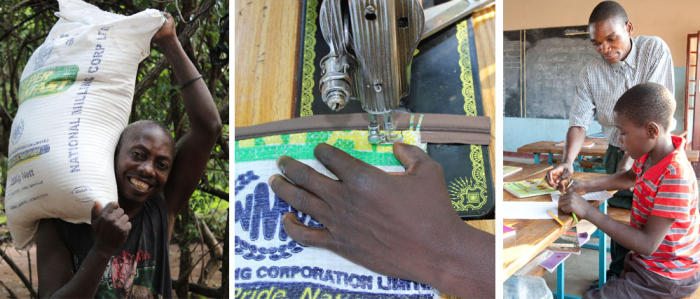
Mealie meal, or nshima, is the staple food of Zambia and is made from ground up maize. It is sold in 25kg and 50kg sacks made from woven plastic. We recycle these ubiquitous maize sacks, throw in a touch of Tribal Textiles magic with fabric linings and decoration and turn them into AMAIZING bags for everyday use. We produce everything from simple shopper bags to fashionable laptop bags.
Every single cent of profit made from these bags goes straight to Malimba School, the community school we support. We also run other initiatives to support the school including selling tea towels with animal designs drawn by the pupils and funding extra-curricular activities such as sports competitions.
Practically speaking, do you export your products? If so, whereto, and how do you handle shipping? It seems you have a special arrangement with the Hanada orphanage, which has an important role to play when it comes to packaging.
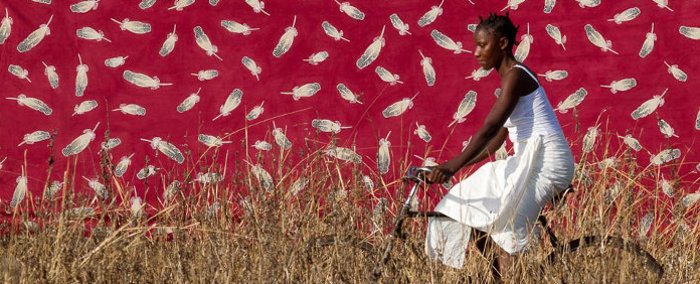
Our biggest market is local, through our flagship shop near the South Luangwa park that welcomes international tourists year round, as well as working with lodges throughout Zambia and Africa in general.
We also have stockists in about 20 countries worldwide (USA, Australia, UK, Europe, Africa…).
And we also successfully launched our e-shop in 2015, from which we ship all over the world. A proportion of shipping cost is indeed going to Hanada orphanage.
How do you picture the evolution of Tribal Textiles in the coming years? Do you see a need to expand to other countries?

Our aim is to provide sustainable employment by creating beautiful and qualitative products in the middle of the African bush, in a very remote area where employment is a real issue.
We see ourselves expanding our export market, to be less reliable on the local market and the tourism industry and show our products worldwide. We also aim at developing co-branded collections with designers and other brands we find exciting.
It’s time to wrap things up! Now’s your last opportunity to speak out if there’s anything else you’d like to add. Also feel free to share how people can be in direct contact with you…
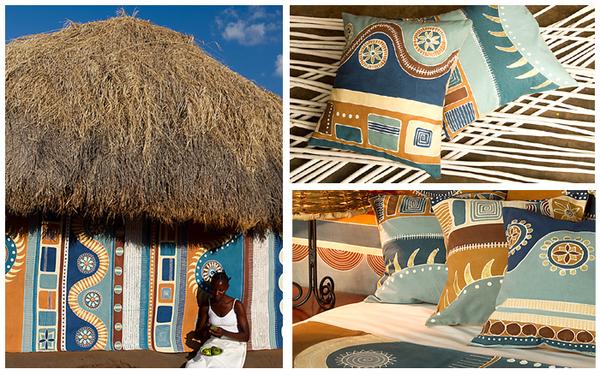
We’d love more people to know about our beautiful designs and exciting products – you can find us on Facebook, Instagram, Pinterest and Twitter. Join the Tribe!
Zikomo kwambiri Raphaelle! 😉

